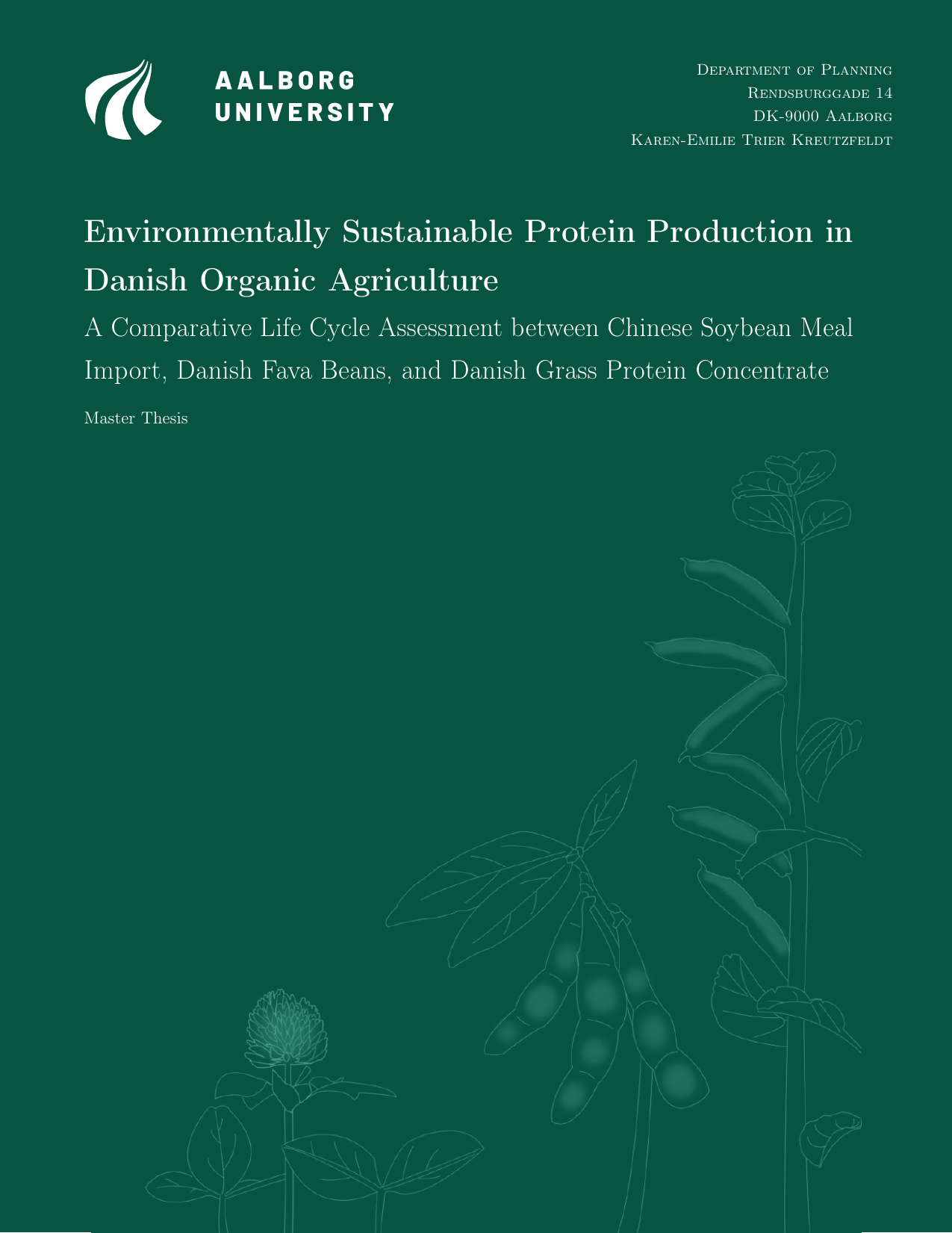
Environmentally Sustainable Protein Production in Danish Organic Agriculture - A Comparative Life Cycle Assessment between Chinese Soybean Meal Import, Danish Fava Beans and Danish Grass Protein Concentrate: A Comparative Life Cycle Assessment between Chinese Soybean Meal Import, Danish Fava Beans and Danish Grass Protein Concentrate
Translated title
Environmentally Sustainable Protein Production in Danish Organic Agriculture - A Comparative Life Cycle Assessment between Chinese Soybean Meal Import, Danish Fava Beans and Danish Grass Protein Concentrate: En Komparativ Livscyklus Analyse mellem Kinesisk Sojakage import, Danske Hestebønner og Dansk Græsprotein
Term
4. Term
Publication year
2022
Submitted on
2022-06-02
Pages
118
Abstract
Background: The organic sector aspires to a fron- trunning position in sustainability by increasing self- sufficiency. In this case, it is desired to phase out the import of soybean meal as protein feed and increase national alternatives instead. Thus, this study aims to environmentally assess the differences in the im- pact of the soybean import compared to Danish fava beans and grass protein concentrate (GPC). Method: The assessment is performed as a conse- quential life cycle assessment (LCA), based on the ISO14040, 2006 and ISO14044, 2006 with the use of Exiobase database. Results: The LCA results show soybean meal import has the lowest impact on nature occupation and global warming, fossil followed by fava beans and lastly grass protein concentrate with the highest impacts. In res- piratory inorganics, soybean meal has the highest im- pact, followed by GPC and fava beans with the lowest impacts. Conclusion: At an overall level can be concluded that the soybean meal import has the lowest environ- mental impacts compared to fava beans and grass pro- tein concentrate. This indicates that the production site does not necessarily influence the environmental impact positively. Instead, it is a question of how to re- duce the meat demand among consumers; thus, plant- based protein can increase market share. Danish pro- duction of protein crops for human consumption will positively affect the aspired position in sustainability
Background: The organic sector aspires to a fron- trunning position in sustainability by increasing self- sufficiency. In this case, it is desired to phase out the import of soybean meal as protein feed and increase national alternatives instead. Thus, this study aims to environmentally assess the differences in the im- pact of the soybean import compared to Danish fava beans and grass protein concentrate (GPC). Method: The assessment is performed as a conse- quential life cycle assessment (LCA), based on the ISO14040, 2006 and ISO14044, 2006 with the use of Exiobase database. Results: The LCA results show soybean meal import has the lowest impact on nature occupation and global warming, fossil followed by fava beans and lastly grass protein concentrate with the highest impacts. In res- piratory inorganics, soybean meal has the highest im- pact, followed by GPC and fava beans with the lowest impacts. Conclusion: At an overall level can be concluded that the soybean meal import has the lowest environ- mental impacts compared to fava beans and grass pro- tein concentrate. This indicates that the production site does not necessarily influence the environmental impact positively. Instead, it is a question of how to re- duce the meat demand among consumers; thus, plant- based protein can increase market share. Danish pro- duction of protein crops for human consumption will positively affect the aspired position in sustainability
Documents
